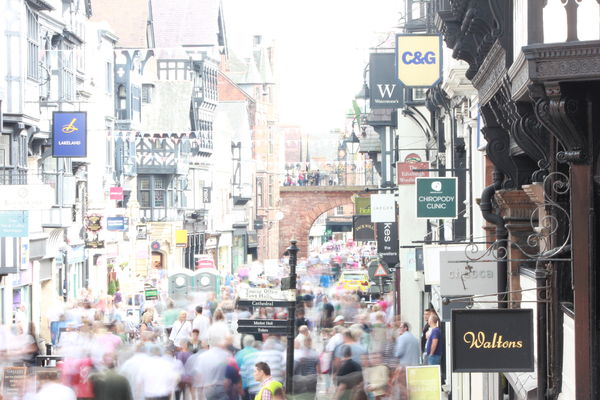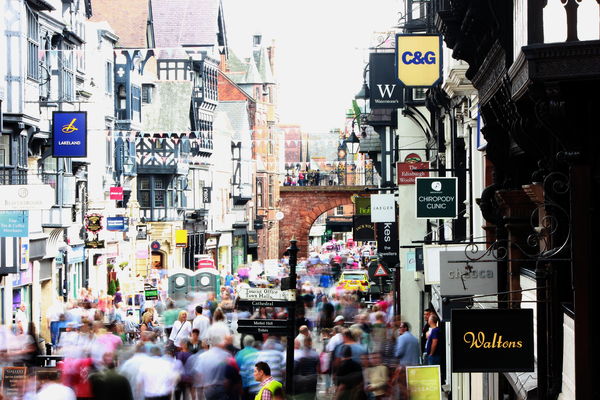Do I need a ND filter?
Aug 20, 2012 11:50:11 #
I took this shot the other day as a bit of an experiment to try out the 'blur' effect. The second shot has been darkened slightly in PP. I am reasonably happy with the composition and the effect for a first quick try (I only had a couple of minutes and had to sit the camera on a balcony ledge). I was wondering if the washed out whites/sky would be eliminated with the use of a ND filter. Is it always necessary for this type of shot in bright daylight? Settings were as follows: Canon 550d with a 50 - 250mm lens on shutter priority mode. 1.6 second shutter speed, AV F/25 and ISO at 100. All advice greatly received.


Aug 20, 2012 12:36:43 #
Yeah...at that long shutter duration your camera was trying to go to a smaller lens aperture to compensate, but couldn't go that far. An ND filter will allow for an aperture that's in the workable range for your lens.
Try an ND4 to see if you can get by with buying only one filter. You may, or may not, need other densities later.
I like your idea, keep on workin' it!
Try an ND4 to see if you can get by with buying only one filter. You may, or may not, need other densities later.
I like your idea, keep on workin' it!
Aug 20, 2012 15:54:15 #
Thanks Danilo. I'll look into getting a filter and experiment with it. Is it best just to use the shutter priority setting until I master it?
Aug 20, 2012 19:13:56 #
Sure, shutter priority is fine. You're still actually controlling both of the exposure adjustments: if you need a smaller aperture, just bump your shutter setting down; larger aperture bump it up. The main thing is to learn to be aware of how your adjustments are affecting your photo. It may take time, but you'll find it to be second nature to you sooner or later.
BTW: If you feel you're going to work with the long shutter durations as you go along, it will pay to get a good quality ND4 filter, as it WILL affect your photos, for good or for bad. Luckily, in digital, there are few filters that are really important (ND's and CIRCULAR polarizing) so it's not like you need tons of filters, like in the old film days.
BTW: If you feel you're going to work with the long shutter durations as you go along, it will pay to get a good quality ND4 filter, as it WILL affect your photos, for good or for bad. Luckily, in digital, there are few filters that are really important (ND's and CIRCULAR polarizing) so it's not like you need tons of filters, like in the old film days.
Aug 21, 2012 05:04:41 #
Thanks Danilo, your help is much appreciated. It's good to get advice like this otherwise I'd probably end up buying boxes of filters and other paraphernalia that I really don't need!
Aug 21, 2012 05:24:45 #
One more question! Should I spend my money on a variable ND filter or just start with a ND 4 and see how I get on?
Aug 21, 2012 08:17:30 #
Hammerboy wrote:
One more question! Should I spend my money on a variable ND filter or just start with a ND 4 and see how I get on?
You might also, instead of a ND filter, set your exposure compensation way down. This will work if there isn't a LOT of compensation.
Aug 21, 2012 09:08:13 #
A graduated neutral density filter would also help tame that bright sky. Also, use the lower ISO possible.
Aug 21, 2012 10:01:47 #
Getting a VND will save you maney in the long run because you will not need to get an ND 2 and 8.
I would also suggest that you look at getting a circular polorizing filter. A CPL would have helped with the images you posted above.
I would also suggest that you look at getting a circular polorizing filter. A CPL would have helped with the images you posted above.
Aug 21, 2012 10:11:48 #
docrob
Loc: Durango, Colorado
chapjohn wrote:
Getting a VND will save you maney in the long run because you will not need to get an ND 2 and 8.
I would also suggest that you look at getting a circular polorizing filter. A CPL would have helped with the images you posted above.
I would also suggest that you look at getting a circular polorizing filter. A CPL would have helped with the images you posted above.
How?
Aug 21, 2012 10:22:23 #
chapjohn wrote:
...A CPL would have helped with the images you posted above.
I doubt if a polarizer would not have helped. The sky is white, not blue. Sure it is overexposed but I suspect it was also cloudy or the sun was in the wrong the direction for a polarizer. Even if that were not the case, the sky is so small in the picture that it would not matter that much. Furthermore, any reflective surfaces which polarization could have help appear so small.
Aug 21, 2012 10:28:34 #
abc1234 wrote:
A graduated neutral density filter would also help tame that bright sky. Also, use the lower ISO possible.
I agree, since the top portion of the photo is more overexposed than the lower portion, a graduated ND should work better. You could also try a polarizing filter if you have one - I find that it can really help with a blown out sky.
Aug 21, 2012 10:39:51 #
[quote=ecobin]
It will help the blown out sky only because the polarizer take two or three f-stops. Your foreground will then be badly underexposed.
abc1234 wrote:
...You could also try a polarizing filter if you have one - I find that it can really help with a blown out sky.
It will help the blown out sky only because the polarizer take two or three f-stops. Your foreground will then be badly underexposed.
Aug 21, 2012 15:45:39 #
docrob wrote:
How?
chapjohn wrote:
Getting a VND will save you maney in the long run because you will not need to get an ND 2 and 8.
I would also suggest that you look at getting a circular polorizing filter. A CPL would have helped with the images you posted above.
I would also suggest that you look at getting a circular polorizing filter. A CPL would have helped with the images you posted above.
How?
I would suggest a CPL because it enhances the sky and the colors a little. Don't get confused about the direction of the sun when using a CPL. Turn the dail until you like the image, then shoot. It seems that using a CPL only when you are 90 degrees from the sun is limiting the capability of great piece of equipment.
Aug 21, 2012 18:01:04 #
chapjohn wrote:
I would suggest a CPL because it enhances the sky and the colors a little. Don't get confused about the direction of the sun when using a CPL. Turn the dail until you like the image, then shoot. It seems that using a CPL only when you are 90 degrees from the sun is limiting the capability of great piece of equipment.
Sorry but I disagree with the information in this post. A polarizer works best when the sun in the focal plane of the camera and with a bright, cloudless sky. As these conditions decrease, so does the amount of polarization. In short, the sky will not be as dark and reflections will not be as reduced.
The comment about 90 degrees does not limit the capability of the filter but maximizes it. Ultimately, looking thru the filter, whether or not it is on the camera, tells you how well the filter is working. Word of caution: do not wear polarizing sun glasses. Things will eventually become black when the two filters are perpendicular to each other.
Polarizers are great accessories when used properly.
If you want to reply, then register here. Registration is free and your account is created instantly, so you can post right away.





